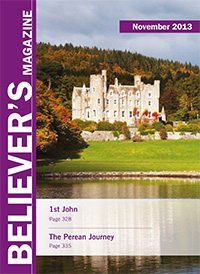What is the meaning of the offerings mentioned in Ezekiel 45.15-25 and who is the prince? If our Lord Jesus was "once offered to bear the sins of many", and by this offering "perfected forever them that are sanctified" (Heb 9.28; 10.12-14), how can there be any more sin offering?
These offerings I judge to be memorials of the great atoning sacrifice of Christ, not having any virtue in themselves, but simply pointing back to and keeping up the memory and proclaiming the efficacy of that great work. Restored Israel in the Millennium will be taught through these offerings the debt they owe as a restored nation to the death of Christ. There will be a literal altar in the midst of the new temple (Ezek 43.18). Mention is made of this same millennial altar in Psalm 51.19 and Isaiah 60.7. No amount of spiritualising the last nine chapters of Ezekiel can deny a literal fulfilment of these detailed prophecies. Of course these offerings will not take away sin, only the sacrifice of Christ can do that.
The prince is one raised up at the time under the authority of the Lord Jesus. He cannot possibly be the Messiah, for the following reasons. He will offer a sin offering for himself (Ezek 45.22). He will have literal sons and a family (46.16). Then again he will worship (46.2). These are facts that preclude any reference to the Lord Jesus. The prince appears to be a go-between bringing the people and their offerings to the priests in the sanctuary. He will fill a new and very important function for Israel. Some even think that the prince must be David. David certainly will be raised from the dead to be in the millennium (Jer 30.9; Ezek 34.23-24), but he will be a royal prince rather than a religious prince. During the Millennium it appears that David will be the vicegerent on earth of the Lord Jesus the Messiah. He will be a prominent figure in Israel's religious devotions. It is rather interesting to note that Ezekiel seems to be the only Old Testament prophecy that mentions this prince.
John J Stubbs
Can we distinguish three separate events that our Lord Jesus Christ, as the Servant of Jehovah, has been anointed to inaugurate: 1) the day of grace ("the acceptable year of the Lord"), 2) the day of the Lord ("the day of vengeance of our God"), and 3) the millennial reign of Christ ("to comfort all that mourn") (Is 61.2)?
The Lord Jesus identifies Himself as the speaker in Isaiah 61, and thus as the Servant of Jehovah, since, having read from vv.1 and 2a in the synagogue at Nazareth, He "began to say unto them, This day is this scripture fulfilled in your ears" (Lk 4.21).
Indeed the Lord Jesus confirmed that the words "to proclaim the acceptable year of the Lord" would be fulfilled by His ministry, having Himself been anointed with the Holy Spirit on the occasion of His baptism (Lk 3.21-22). We are not surprised that those present "wondered at the gracious words (or "words of grace") which proceeded out of his mouth" (Lk 4.22), for they were in perfect accord with "the acceptable year of the Lord", the "year" standing not for a particular date but for an extended period of time.
It has often been observed that the Lord Jesus ceased reading after the first clause of Isaiah 61.2 and "closed the book". The book will remain closed until it is opened again to commence "the day of vengeance of our God". John writes, "And I saw when the Lamb opened one of the seals" (Rev 6.1); this will mark the beginning of the day of the Lord. The expression "the day of vengeance" should be contrasted with "the acceptable year"; this indicates that God will shorten the period of His wrath.
The third expression is "to comfort all that mourn"; Zechariah identifies those who shall mourn: "they shall look upon me whom they have pierced, and they shall mourn for him, as one mourneth for his only son" (Zech 12.10). The reference is to the godly remnant in Israel at the time of Christ's manifestation as He returns to set up His millennial Kingdom. They will confess, "But he was wounded for our transgressions, he was bruised for our iniquities: the chastisement of our peace was upon him; and with his stripes we are healed" (Is 53.5).
David E West









